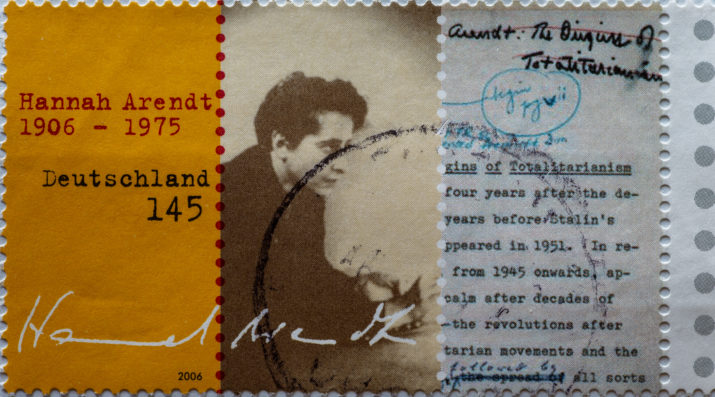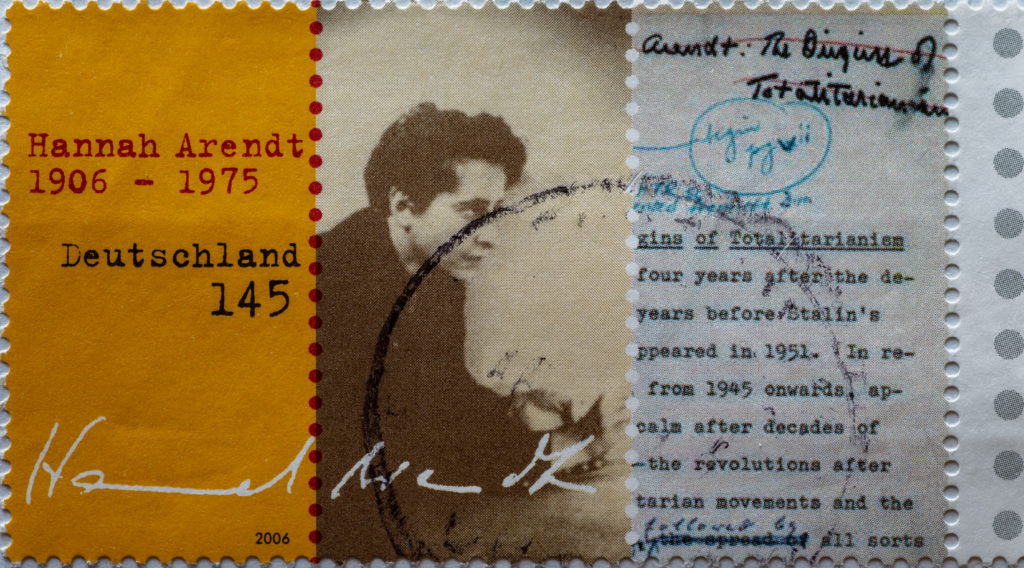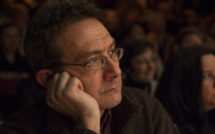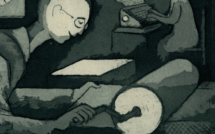
Thinking through the “Russian Problem:” Learning from Hannah Arendt and the “German Problem”

This is part of a series on the Ukraine Crisis.
It is not too early, even as Russian troops impose horrific destruction and suffering on Ukrainian soldiers and civilians, to think of the future place of Russia in Europe. A similar concern occupied many minds in regard to the place of Germany in Europe after WWI and WWII. Unfortunately, after WWI, the Allies failed to agree with one another, and with Germany, on a proper role and place for this defeated yet powerful country in the middle of Europe. The failure to solve the so-called “German problem” contributed to the rise of Nazism and to WWII. Transatlantic collaboration was more successful, at least in Western Europe, after the end of WWII. Eventually, a reunified Germany joined the European Union (EU) in 1990 with the agreement of the four occupying powers, including the Soviet Union, which was then engaged in a process of democratization. Countries formerly under the sway of Soviet imperialism also joined the EU in the early twenty-first century with several of the Soviet Union’s fifteen republics becoming independent nation-states, such as Ukraine in 1991. This demonstrated how a major imperial power could transform itself bloodlessly, with much of the credit going to the Soviet leadership and Soviet peoples, including Russians and Ukrainians, who rejoiced at the time.[1]
Today, European democracies and their North American allies have a “Russian problem” on their hands. Germany is often cited as the poster nation of atonement and reparation. But the role of some of the victims of Nazi aggression in thinking through the place of Germany in a liberated Europe, even while the war against Nazi Germany was still raging, is little acknowledged despite being a well-documented fact.[2] In 1944, eight European resistance movements issued a public statement on this question while some Jewish victims of the Holocaust also gave much thought to the future of Germany and Europe, among them Hannah Arendt, Léon Blum, and Simone Veil.[3] The 1952 founding of the European Coal and Steel Community, and the return of the French-occupied Saar to the Federal Republic of Germany after a 1955 referendum, institutionalized such mindsets, although Arendt and Veil had no direct part in these founding events.
As the war rages in Ukraine, three important lessons can be learned from Arendt, a survivor from the Holocaust. She was raised in a Jewish-German family in Königsberg (today Kaliningrad) and studied philosophy with Martin Heidegger and Karl Jaspers. In 1933, she fled to France and later to the US where she published The Origins of Totalitarianism in 1951, the first of her many influential books.[4] First, Arendt exemplifies the commitment to think through apparently insoluble problems. She did not back off from confronting a crucial question in 1945: Can Germany change? Her “Approaches to the ‘German Problem’” (1945) and her discussion of imagination and the “understanding heart” in “Understanding” (1954) stand as models for us to think of “problem countries.”[5] According to Arendt, “understanding” is a long-term and repetitive pondering process, which does not always lead to unequivocal solutions and requires imagination, which she calls the “understanding heart.” Arendt compares these faculties to an “inner compass,” which permits us to “see things in their proper perspective:” not too closely, so that we can judge without bias or prejudice, and not too remotely, so that we can understand an issue “as if it were our own affair.” The “particular gift of an understanding heart,” and “not mere reflection or mere feelings, makes it bearable for us to live with people, strangers forever, in the same world, and makes it possible for them to bear with us.”[6]
Arendt cites King Solomon as the exemplar of a public actor gifted with imagination and “an understanding heart.” Both Jewish and Christian traditions recall how this gift enabled Solomon to confront an unsolvable problem with deep human consequences: he adjudicated between two prostitutes claiming to be the mother of the same baby, and decided that the child should be cut in two in order to satisfy both parties. The little boy is reunited with his birth mother when she begs for the baby’s life to be spared even if it means losing him to her rival, thus revealing to the king that she is the child’s true mother.[7] Beside strategic calculations and sober analyses of power, there is a need for imagination and the understanding heart to reflect wisely on the future place of Russia in Europe, so that the peace missed in the last thirty years can be won once and for all. Second, Arendt condemns “racist” thinking and challenged the idea of an unchangeable “German character,” explaining that the evils to be fought were fascism and Hitler, not the German national character and history. For Arendt, there had been a breakdown of the German tradition under Nazi rule,[8] so that she opposed plans to dismember Germany further. With Polish socialists, she warned against Germany’s yearning for revenge and the danger of “falling into some kind of racism after the defeat of its German variety.” Third, Arendt endorsed the forward-looking slogan of the European resistance movement EUROPE and “the cardinal principle of French resistance:” libérer et fédérer. The “German problem” is a “European problem,” she wrote.[9] Later on, she would develop these themes more philosophically in The Human Condition.[10]
Arendt concluded her essay on the “German problem” in a somewhat disabused tone. She feared that the return of governments-in-exile would put a stop to the “new feeling of European solidarity,” because these governments’ existence hinged on the restoration of the status quo. Controversially, she warned against the concepts of “collective security,” “spheres of influence,” and “alliances,” convinced that the only way to sustain the “political renaissance of the European peoples” was the course taken by the European resistance. Beyond this, she never wrote again on the role of civil society in sustaining reconciliation and post-WWII settlements in Western Europe. This remains an under-studied topic in English-language scholarship to this day, which is surprising given the thousands of European and North American activists who engaged in rapprochement efforts after WWII.[11]
The task of reaching out to the Russian state is not a matter of if, but of when and how. American scholars, journalists, and some retired diplomats (rather than political leaders) seek to “understand” what went wrong with Russia since the end of the Cold War. Pointing to misunderstandings, they describe how the US-initiated Partnership for Peace, which had been conceived to include Russia, was shed by President Clinton in favor of NATO enlargement to the East, partly for domestic electoral reasons.[12] They also cite George Kennan, the US expert on Soviet affairs and thinker of containment policies, who warned against this expansion in 1997.[13] Are these points moot in the face of the Russian invasion of Ukraine? Perhaps, and yet, for a non-violent settlement to take place, the time will come for North Americans and Europeans to acknowledge as legitimate, or at least “understandable,” some of the Russian grievances, which are shared in Russia beyond Putin’s circle.[14]
Arendt warns us also against the dangerous trap of historical determinism and “racism.” Russia and its people are not fated for dictatorship, and the “European failure” to think of Russia in a different way than as a hereditary enemy, and conversely, is “saddening.”[15] Former US ambassador to Russia and scholar Michael McFaul remembers experiencing a “euphoric moment” as a graduate student in 1991 in Moscow. The Russians “were victors as well in the Cold War and Ukrainians and Estonians and Georgians whom I knew at the time as well.”[16]
Indeed, at the end of the Cold War, a majority of Soviet citizens did not experience defeat at the hands of the West, rather a transforming liberation thanks to their own leaders such as Boris Yeltsin in Russia and Eduard Shevardnadze in Georgia, and to their own efforts.[17] They embraced the new order, which made Ukraine an internationally recognized nation-state for the first time in its fraught history. And the Commonwealth of Independent States, which included the Soviet Union’s three founding republics—Russia, Georgia, and Ukraine—put an end to the Soviet Union peacefully around a conference table in December 1991. Admittedly, euphoria was short-lived because of the painful transition to market economy and the insidious return to authoritarianism in Russia in the following thirty years. In 1998, cultural theorist Svetlana Boym wondered, in a moment of reflective nostalgia with a group of Moscow intellectuals, why the days of August 1991, when intellectuals, workers, entrepreneurs, and soldiers briefly united against a hardliner putsch, “so quickly became irrelevant”—a question she left pending.[18] The Russian democrats’ “nonchalant dismissal of national history as a source of positive inspiration” prevented them from offering alternative narratives during the 1990s, when President Boris Yel’tsin celebrated tsarist times as a source of Russian identity and “endorsed forgiving” Soviet-era abuses “with a dose of forgetting.”[19] The dearth of constructive liberal narratives about the past persisted in the Putin years, while Stalin’s actions and legacy underwent an official rehabilitation.[20]
McFaul argues that even if Russians are shaped by historical legacies, cultural norms, and static institutions, “they are not trapped forever by them.” Although political science cannot predict the future, he thinks it more unlikely that Putinism will survive another two decades than for a new system, possibly a democratic one, to emerge.[21] Maria Zavialova, the Russian-born and trained curator of the Museum of Russian Art in Minneapolis-Saint Paul, notes that, although the Russian system has become more repressive, “society is full of a lot of free-thinking people.”[22] Russian free-thinking people are currently being arrested across Russia, but they have been around for a long time. It is not by chance that the European Parliament named its yearly award for Freedom of Thought the “Sakharov Prize.” Already in the 1970s and 1980s, a small minority in Soviet civil society played a meaningful and unusually courageous role in challenging its dictatorial government to apply the Helsinki agreements’ articles on democracy and respect for human rights in the Soviet Union. Some in Western European civil society supported these efforts.[23]
All attention is focused now on how to fight Russian aggression and defend Ukraine’s sovereignty, as it should be. But it is not too early to think of the future place of Russia in Europe. For over a decade, there were little constructive plans on offer to Russia, either from NATO or the EU.[24] And can anyone cite examples of the kind of transnational coalitions, which gathered activists for post War II rapprochements in the 1940s and 1950s in the case of the West-Russian relationship, which needed much repair also after the end of the Cold War? There were more proactive policies toward other Eastern European countries. In 2004, the EU launched a new Neighborhood Policy to strengthen “prosperity, stability and security” among countries that were not candidate to accession, including six in Eastern Europe. In 2008, it started an enhanced Eastern Partnership Initiative (EaP) directed to Armenia, Azerbaijan, Belarus, Georgia, Moldova, and Ukraine. EaP offered visa-free travel to the EU for its 76 million people and Association and Deep Free Trade Area (DFTA) against agreements for domestic reforms, although with no promise of full membership. [25] Russia, which had considered EaP countries as its “near abroad,” felt threatened. It responded by launching an alternative association in 2010, which became the Eurasian Economic Union (EEU) in 2015. Ukraine chose the EaP over the EEU in 2014 after the Euro Maidan demonstrations; Russia reacted by annexing Crimea where it has a large navy base, and by supporting secessionist movements in the Ukrainian Donbas region, thus breaking the rule of international law and norms.
Some talk of the Iron Curtain falling again across Europe. Transnational civil society must resist being divided along these lines. Ukrainian professor of European literature Constantin Sigov at Mohila University in Kyiv, in an open letter sent out on February 23, urges his readers not to choose between the human rights of Ukrainians and those of Russians:
The closing down of the Memorial International Association in Russia is in fact linked to the increased hostility of the Putin regime towards Kyiv. This link is rarely mentioned in the West. Yet it is essential. The Kremlin considers as taboo the access to information on the crimes of Stalinism….[Its] maniacal rhetoric about NATO seems absurd as long as one does not see that behind the word NATO the shadow of Nuremberg is hidden.[26]
Today, EU and NATO memberships for Ukraine are on the table again. Civil society is working hard across Europe and North America to support Ukrainians with shelter, food, and other needs. The EU and NATO celebrate their “unity” as they face Russian aggression. Yet the brave Ukrainians, armed by their Western allies, fight on their own at the time of this writing. Besides weapons for the Ukrainian armed forces, humanitarian aid and asylum for Ukrainian refugees, punitive sanctions against the Russian state, and support to Russian protestors, ideas for long term peace in Europe are sorely needed also.
Catherine Guisan is a Visiting Associate Professor, affiliated with the Department of Political Science, University of Minnesota, Twin Cities. She is the author of Un sens à l’Europe: Gagner la paix (1950-2003), Paris: Odile Jacob, 2003; A Political Theory of Identity in European Integration: Memory and Policies (2011), and many articles. She taught as a Fulbright Fellow at European University, Saint Petersburg, in 2013, and returned to Russia on other awards in 2015 and 2016.
References
[1] For more on this transition, Catherine Guisan, “Of Political Resurrection and ‘Lost Treasures’ in Soviet and Russian Politics”, Europe-Asia Studies, 2018, 10 (9), 1381-1406.
[2] Hannah Arendt, “Approaches to the ‘German Problem’,” in Essays in Understanding 1930-1945, New York: Schocken Books, 1994, 112-115; Henri Rieben, “L’espérance de celles et de ceux qui souffrent, qui se battent et qui réfléchissent à l’avenir,” dans Des guerres européennes à l’union de l’Europe, Lausanne: Fondation Monnet pour l’Europe, Centre de Recherches européennes, 1987, 53-58.
[3] Arendt and Rieben, ibid.; Simone Veil, Une vie, Paris: Stock, 2007.
[4] Hannah Arendt, The Origins of Totalitarianism, San Diego, New York , London, Harcourt Brace &Company, 1979 .
[5] Hannah Arendt, ibid, 106-120; and “Understanding and Politics,” in Essays in Understanding 1930-1945, New York: Schocken Books, 1994, 307-327.
[6] Arendt, “Understanding and Politics,” 322 and 323.
[7] “Solomon Judges a Difficult Case,” King 3, 16-28, Good New Bible, New York: American Bible Society, 1976, 372-3.
[8] Arendt, “Approaches to the ‘German Problem,’” 108-112.
[9] Ibid., 115-116,
[10] Arendt proposed two palliatives to the potentially deadly consequences of human action. First, she advocated forgiveness, so that the past would not dictate the present. Forgiving is not a feeling of abandoning hate, but an action based on the willingness to re-engage with former enemies for the sake of the shared world. Arendt’s second palliative is promising, i.e. endorsing laws and constitutions in politics, which would bound actors to certain courses of action. Arendt, The Human Condition, Chicago: Chicago University Press, 1958, 236-247.
[11] On the role of civil society in post-WWII reconciliatory processes, see Catherine Guisan, A Political Theory of Identity in European Integration: Memory and policies, Abingdon, UK, and New York: Routledge, 2011, 36-40 and 201-224.
[12] Mary Elise Sarotte, “Russia, Ukraine and the 30-year quest for a post-Soviet order,” Financial Times, February 24, 2022. https://www.ft.com/content/742f15fc-675a-4622-b022-cbec444651cf (downloaded February 25, 2022); Michael Staack, “Coping with Russia: past failures, future prospects, and implications for the Baltic Sea region,” Danish Foreign Policy Review, 2018, 46-76.
[13] Thomas L. Friedman, “This is Putin’s War. But America and NATO Aren’t Innocent Bystanders,” New York Times, February 21, 2022.
[14] This observation is based on my conversations in 2013, 2015, and 2016 with Russian scholars and activist citizens who were critical of the Putin regime.
[15] Laure Lugon, “Les larmes de l’ambassadeur sur une page déchirée,” Le Temps, February 26, 2022. https://www.letemps.ch/opinions/larmes-lambassadeur-une-page-dechiree (downloaded on February 28, 2022).
[16] “Putin’s Russia today: Former Ambassador Michael McFaul on ‘Intelligence Matters.’” CBS News, October 21, 2021. https://www.cbsnews.com/news/putins-russia-today-former-ambassador-michael-mcfaul-intelligence-matters/ (downloaded January 12, 2021).
[17] Leon Aron, Roads to the Temple: Truth, Memory, Ideas and Ideals in the Making of the Russian Revolution, 1987-1991. New Haven and London: Yale University Press, 2012; Arkady Ostrovsky, The Invention of Russia: From Gorbachev’s Freedom to Putin’s War, New York, Viking, 2015.
[18] Svetlana Boym, The Future of Nostalgia, New York: Basic Books, 2001, 71.
[19] Kathleen E. Smith, Mythmaking in the New Russia: Politics and Memory during the Yeltsin Era, Ithaca, NY, & London: Cornell University Press, 2002, 29, 172.
[20] Ilya Nuzov, “The Role of Political Elite in Transitional Justice in Russia: From False ‘Nurembergs’ to Failed Desovietization,” U.C. Davis Journal of International Law & Policy, 20(2), 313.
[21] McFaul, ibid.
[22] John Rash, “Echoes of Stalinist past as Russia silences its top human rights group,” Star Tribune, Saturday January 15, 2022; Catherine Guisan, “To Russia with solidarity: Why the Shutting Down of Russia’s Memorials Should Matter to Us,” January 27, 2022. https://thesocietypages.org/holocaust-genocide/to-russia-with-solidarity-why-the-shutting-down-of-russias-memorials-should-matter-to-us/.
[23] See the interesting testimony of Norwegian painter Victor Sparre, The Flame in the Darkness: The Russian Human Rights Struggle- as I have seen it. Trans. Alwyn and Dermot McKay, Foreword Vladimir Maximov, London: Grosvenor Books, 1979.
[24] Staack, ibid.
[25] See the European Union (EU) portal for the 2004-2022 developments of the policies “EU Neighbours.” https://www.euneighbours.eu/en/policy/european-neighbourhood-policy-en (downloaded March 11, 2022).
[26] “Lettre d’un intellectuel ukrainien sous les bombes,” Le Temps, February 26, 2022. https://www.letemps.ch/opinions/lettre-dun-intellectuel-ukrainien-bombes (downloaded February 28, 2022). Translation into English by the author.
Photo: GERMANY – CIRCA 2006: a postage stamp printed in Germany showing a portrait and writings on the 100th birthday of political theorist and publicist Hannah Arendt | Shutterstock
Published on March 14, 2022




